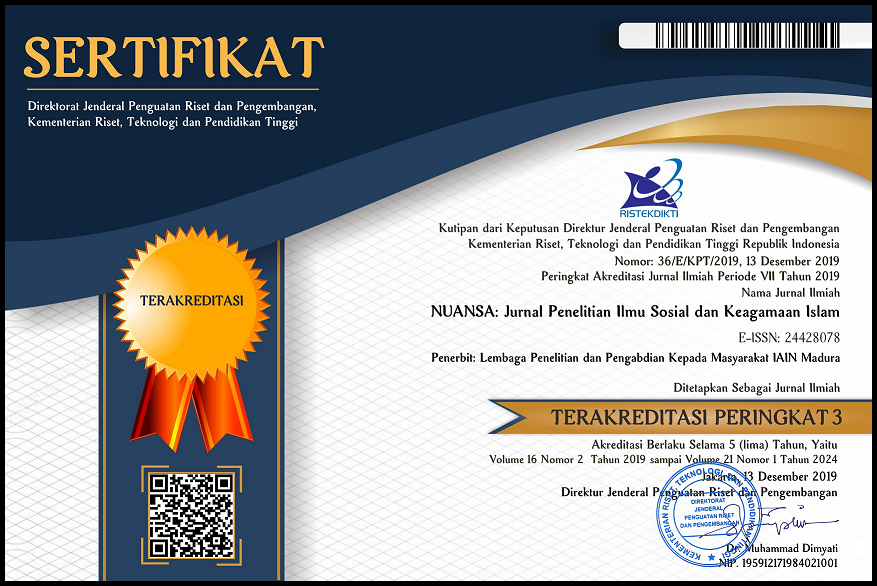PENGALAMAN NELAYAN BINTARO GAPURA SUMENEP DALAM PENENTUAN ARAH KIBLAT DAN WAKTU SHALAT (PERSPEKTIF FIQH HISAB-RUKYAT)
 Abstract views: 431
,
Abstract views: 431
,
 PDF downloads: 339
PDF downloads: 339
Abstract
Downloads
References
Rahman Ritonga dan Darsa Soekartadiredja, Rahasia Alam Semesta, Jakarta : Planetarium 1979
Abdur Rachim, Ilmu Falak I, Yogyakarta : Liberty, 1983.
Achmad Warson Munawwir, Kamus Al-Munawwir Arab-Indonesia Terlengkap, cet. I, Yogyakarta : Pustaka Progressif, 1984
Al-Farghani dan ICMI Orsat Belanda, Mawaqit Islamic Time Keeping, Copyright 1992-1993 Version 1.0.
Ali As-Sabuni, Rawai’u Al-Bayan Tafsir ayat al-Ahkam, Beirut : Dar al-Fikr, 1984.
Departemen P & K, Kamus Besar Bahasa Indonesia, edisi ke 2, cet. IX, Jakarta : Balai Pustaka, 1999
Djoni N. Dawans, Dasar-dasar Astronomi Bola, Bandung : ITB, 1996
Dahlan, Abdul Aziz, Ensiklopedi Hukum Islam, Jakarta:PT. Ikhtiar Baru Van Hoeve, 1997.
Fahrurrazi Djawahir, Falak Matahari dan Bulan, Yogya: Fak. Teknik UGM, 1994.
Fakhruddin ar-Razi, at-Tafsir al-Kabir, Beirut : Dar al-Fikr, 1978.
Hadari Nawawi, Penelitian Terapan, Yogyakarta : UGM University Press, 1994
Ichtijanto, Almanak Hisab Rukyat, Jakarta : Badan Hisab Rukyat Depag RI, 1981
J. Meeus, Astronomical Farmulae for Calculators, cet. III, Virginia : Willman-Bell, 1985. Atau diukur dari utara ke barat. Lihat R.m. Green, Spherical Astronomy, London: Cambridge, 1985.
Mansur Hanna Jordak, Al-Qamus al-Falaki Inklizi-Arabi, cet. I, Beirut : Maktabah Libanon, 1950
Moedji Raharto, Manusia, Islam dan Astronom, makalah disampaikan dalam Pelatihan Hisab Rukyat Tingkat Nasional pada tanggal 16-18 Juni 1997 di Tugu Bogor.
Munawwir, Al-Munawwir, Yogyakarta:; Pustaka Progressive, 1984
Munir Ba’albaki, Al-Mawrid A Modern English-Arabic Dictionary, cet. III, Beirut: Dar al-Ilm li al-Malayin, 1970
Muhammad Wardan, Hisab Urfi dan Hakiki, Yogyakarta: tnp, 1957.
P. Simamora, Ilmu Falak (Kosmografi), Jakarta : Pejuang Bangsa, 1980
Purwanto, Visifibilitas Hilal Sebagai Acuan Penyusunan Kalender Islam, Bandung : Skripsi Jurusan Antronomi ITP, 1992
R.E.W. Maddison, A Dictionary of Astronomy, London : Hamlyn, 1980.
Saaduddin Djambek, Arah Kiblat, Jakarta : Tintamas, 1956
Salam Nawawi, Rukyat Hiisab di Kalangan NU-Muhammadiyah, Surabaya:Diantana, 2004
Susiknan Azhari, Ilmu Falak ; Teori dan Praktek, Yogyakarta ; Lazuardi, 2001
The journal operates an Open Access policy under a Creative Commons Attribution-NonCommercial 4.0 International License (CC-BY-NC) 
Authors who publish with this journal agree to the following terms:
- Authors retain copyright and grant the journal right of first publication with the work simultaneously licensed under a Creative Commons Attribution License that allows others to share the work with an acknowledgement of the work's authorship and initial publication in this journal.
- Authors are able to enter into separate, additional contractual arrangements for the non-exclusive distribution of the journal's published version of the work (e.g., post it to an institutional repository or publish it in a book), with an acknowledgement of its initial publication in this journal.
- Authors are permitted and encouraged to post their work online (e.g., in institutional repositories or on their website) prior to and during the submission process, as it can lead to productive exchanges, as well as earlier and greater citation of published work.






















